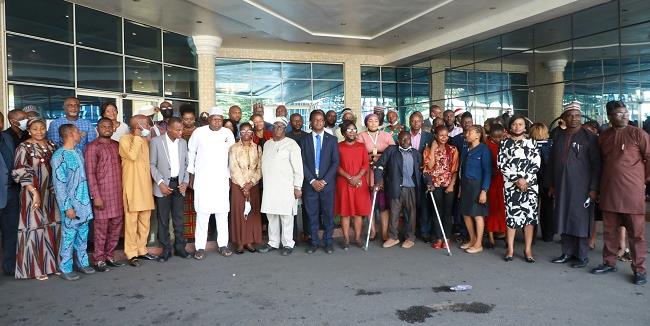Stakeholders have expressed commitment in providing technical assistance to facilitate implementation of National Adaptation Plans (NAPs), across the country.
The stakeholders in environment and agriculture fields, said this at a workshop on Climate Adaptation Support Program (CASP), organised by AKADEMIYA2063, in Abuja on Friday.
AKADEMIYA2063 is an Africa-based non-profit research organisation with headquarters in Kigali, Rwanda, and a regional office in Dakar, Senegal.
Its mission is to provide data, policy analysis, and capacity-strengthening support to enable African countries to achieve the African Union’s Agenda 2063 goals of inclusive and sustainable development and economic prosperity.
The workshop is in collaboration with Resource and Environmental Policy Research Centre, University of Nigeria, Nsukka, Environment for Development (REPRC-EfD) Nigeria and the Global Centre on Adaptation.
The Director of the REPRC-EfD Nigeria, Dr. Nnaemeka Chukwuone, said that the workshop was organised to validate research findings, meant to facilitate implementation of the National Action Plan on climate change.
The NAPs are a continuous, progressive and iterative process that follows a country-driven, gender-sensitive, participatory and fully-transparent approach.
According to him, the purpose of the meeting is to conduct consultation and validation of the synthesis report that consists of a review of NAPs implementation progress and an assessment of environmental changes.
“The meeting is expected to bring together, major stakeholders of climate change adaptation in the country.
“The stakeholders will discuss key findings, aspects of the report and propose a way forward for expanding and improving the effectiveness of climate change actions in each case countries,’’ he said.
Chukwuone said that the AKADEMIYA2063 (A2063), in collaboration with the Global Center on Adaptation (GCA), has initiated a Country Adaptation Support Programme (CASP), to help countries implement the NAPs.
He said that the NAPs are designed by countries in response to the Paris Climate Change Agreement.
He said that AKADEMIYA2063 intends to provide technical assistance to inform and facilitate the effective implementation of NAPs in several African countries, including Kenya, Mali, Nigeria, Senegal, and Ethiopia, among others.
He mentioned the assistance as reviewing NAP, its implementation progress and monitoring environmental changes through anomaly analysis, using biophysical indicators such as the normalised difference index, land surface temperature and rainfall.
The director said that empirical evidence showed that small holder farmers fare better when they adopt multiple climate strategies such as diversified cropping system, use of improved seedlings and the application of organic and inorganic fertilizers.
“The adoption of one of the strategies increases the farmers’ income compared with non-adoption. But the highest farm income will be achieved when farmers adopt all the practices jointly, rather than partial adoption.’’
Chukwuone advised policymakers to consider climate adaptation options holistically instead of treating the strategies in isolation.
He said that the policymakers should explicitly design strategies that would enhance the adoption of externally-purchased technological farm inputs jointly with the locally available knowledge-intensive land management options.
He called on farmers to combine the various climate adaption strategies in order to boost their productions and increase their income.
He said that the REPRC-EfD Nigeria focused on major environmental and economic challenges that affect Sub-Saharan Africa, in the areas of agriculture, ecosystem, natural resources and energy, among others.
A Senior Researcher at REPRC-EfD Nigeria, Dr Henry Okoduwa, said that assessment of the economic impact of climate change showed the urgency for farmers to implement adaptation strategies.
Okoduwa said this while presenting findings on a study, titled, ‘Modeling the Economic Impacts of Climate Change and Adaptation Strategies in Nigeria.
According to him, if the country continues on the path of business-as-usual without embracing significant climate adaptation measures, climate change will reduce Nigeria’s economic output.
Also, a Senior Scientist from AKADEMIYA2063, Dr. Mahamadou Tankari, said that the programme is aimed at contributing to adaptation solution in Nigeria and other African countries.
“This is by providing data and frameworks for analysis to answer key questions on climate adaptation.
“The programme also aims to guide policy harmonisation, interventions as well as priority actions that can help meet the objectives of different policy initiative on climate adaptation,’’ he said.
He said that the main goal of AKADEMIYA2063 is to help meet the needs of African countries in terms of data, analytics and mutual learning.
He said that the AKADEMIYA2063 is also for effective implementation of agenda 2063 and the realisation of its outcomes by a critical mass of member states.
NAN



